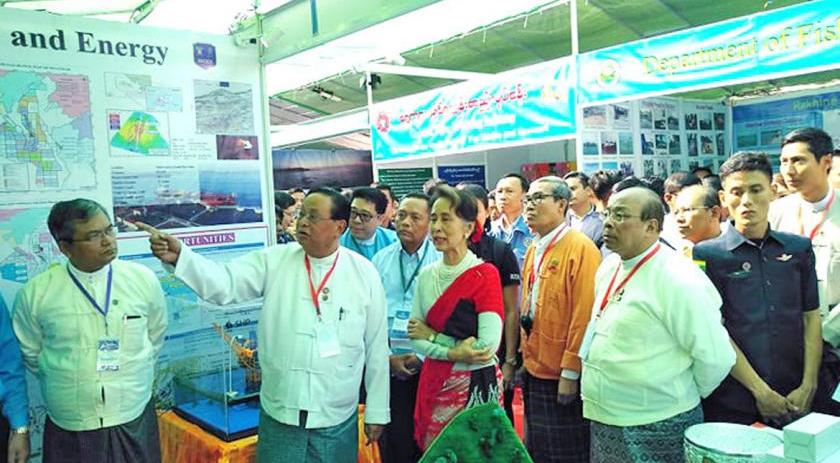
Foreign and domestic companies last week signed 28 expressions of interest (EOI) to conduct business worth a potential US$4.9 billion in the state this year.
The bulk of the EOIs were signed by businesses in the hotel and tourism sector, said U Kyaw Aye Thein, Rakhine State Minister of Finance, Revenue, Planning and Economy.
“These 28 EOIs show that investors are hugely interested in investing in Rakhine State. The Myanmar Investment Commission (MIC) and state government will work together to support the ease of doing business in Rakhine,” said MIC secretary U Aung Naing Oo.
The ministers were speaking at the Rakhine State Investment Fair in Ngapali last week. It was the first such event in Rakhine and held with the aim to draw investments to the state amid the refugee crisis taking place in northern Rakhine and poverty across the state.
“Every kyat spent by this government, every dollar disbursed by its development partners and every dollar invested by the private sector is a vote of confidence in the resilience and potential of Rakhine and its people, State Counsellor Daw Aung San Suu Kyi, said during her speech.
In her speech, the State Counsellor highlighted the positive role that foreign and domestic investments can play in laying strong foundations for the sustainable development of Rakhine State.
“While Myanmar has benefited to a large extent from the opening up for our economy, much of Rakhine’s economic potential still remains untapped. For too long the international community’s attention has been focused narrowly on negative aspects related to problems in North Rakhine rather than on the large picture that shows the immense potential of this state for peace and development,” Daw Aung San Suu Kyi, said.
“We recognise the grave challenges we have to face and overcome. The government identified as a national priority the need for rule of law and sustainable development in Rakhine State. At the same time, we have to address economic issues in Rakhine so that we may achieve the progress and development needed to sustain stability and prosperity, the State Counsellor said.
Daw Aung San Suu Kyi flagged toruism as one of the sectors with the best prospects for growth, saying beaches in Gwa Township and Man Aung Island show potential for eco-tourism destinations. Meanwhile, Mrauk-U is also being considered as a UNESCO World Heritage Site.
The agriculture, livestock breeding, aquaculture, manufacturing, textiles and garments, power generation and distribution, education, health services, infrastructure, real estate and oil and gas industries also have potential, she said.
Meanwhile a slew of infrastructure projects, from road and airport construction to the development of industrial estates and new cities, which are included within the Project Bank and transparent and competitive tender processes for the implementation of the projects will soon begin. The government also highlighted development of the Kyaukphyu Special Economic Zone in providing growth and job opportunities in Rakhine.
Others agreed that economic development will help stabilise the situation in Rakhine. “I believe that the affairs in Rakhine State will be solved by economic development and Japan is providing Official Development Assistance to the government in Rakhine,” said Japan Ambassador of Myanmar Ichiro Maruyama.
“I believe that Rakhine State needs responsible investments, which will bring jobs and learning and contribute to solving the conflict in North Rakhine,” Pascal Gerken, chief executive officer of Oceanfront Investments, who attended in the fair, told The Myanmar Times.
Foreign companies have so far invested up to US$9 billion in hotels and tourism, livestock and fisheries and oil and gas in Rakhine, while local companies are mostly involved in hotels and tourism, according to official data.












